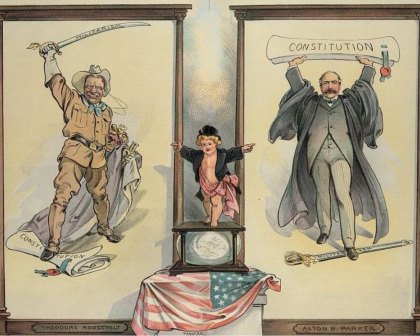Today's Post:
Counting heads: An election lexicon

In this illustration of the 1904 election (Theodore Roosevelt v. Alton B. Parker), Puck stands on a ballot box.
Image: Puck magazine, via Library of Congress
Election is another perfect word (rooted in the Latin electus, meaning choice). But not all terms that we use during elections are so straightforward. Some, in fact, have surprising histories.
So with the help of Webster's New World Collegiate Dictionary (Webster's New World; 2016), Encyclopedia Britannica online, The American Heritage Dictionary (Houghton Mifflin Harcourt; 2016), and Oxford Dictionary's website, here are the origins and definitions for words commonly associated with elections:
- Ballot: The word ballot is taken from an Italian word, Ballotta. The American Heritage dictionary gives this definition: “a small ball once used to register a secret vote.” The balls were deposited in (naturally) a ballot box. A related word is blackball, which the dictionary defines as “a small black ball used as a negative vote.” We now use the blackball to mean the exclusion of someone from a group.
- Candidate: A candidate is, of course, a person seeking an office or award. But the root of the word is Latin (candidatus) and means clothed in white. According to American Heritage, this is taken from “the white togas worn by Romans seeking office.” The word candid has a similar root, candidus, or "glowing, white, pure, guileless."
- Enfranchise: The root of this word is Old French (enfranchir) and means to set free -- poignant, as some advocates argue that low-income citizens are being disenfranchised by laws that require identification before voting. Webster’s first definition is “to set free (as from slavery).” The second definition is “to admit to the privileges of a citizen, specifically, to admit to the right of suffrage.”
- Poll: This is defined as the process of voting in an election or, to use a related term, a polling place is a place to vote in an election. There is also a totally different definition: “the part of the head on which hair grows.” So how did the word poll come to mean the process of voting? There’s a roundabout answer, according to Oxford Dictionary’s website: “The original sense was ‘head,’ and hence ‘an individual person among a number,’ from which developed the sense ‘number of people ascertained by counting of heads’ and then ‘counting of heads or of votes.’"
- Primary: This word, from the Latin root primus, meaning first, comes with a long list of definitions. It means one thing in chemistry, another in botany and something different in astronomy. But for the sake of elections, American Heritage defines it as “a meeting of the registered voters of a political party for the purpose of nominating candidates and for choosing delegates to their party convention.”
- Suffrage: First and foremost, dictionaries define this as the right to vote. But it is also defined as a “short intercessory prayer.” American Heritage gives several roots, including a Latin word suffragari, which means to “express support.”
- Vote: The word is rooted in the Latin word for vow, and is defined by Webster's as a "formal expression of opinion or will in response to a proposed decision."
Related:
Four phrases associated with the Cold War
If you would like to comment, give us a shout, or like us on Facebook and tell us what you think.

